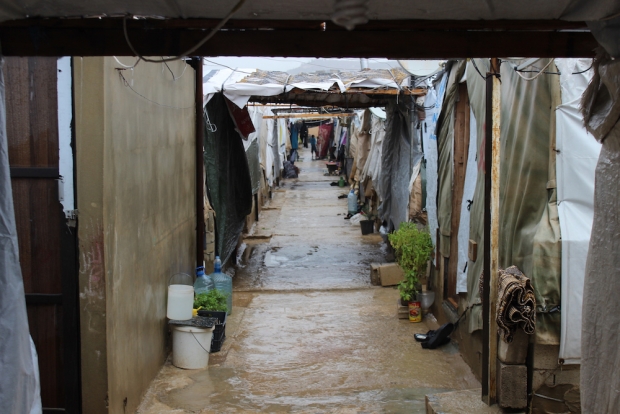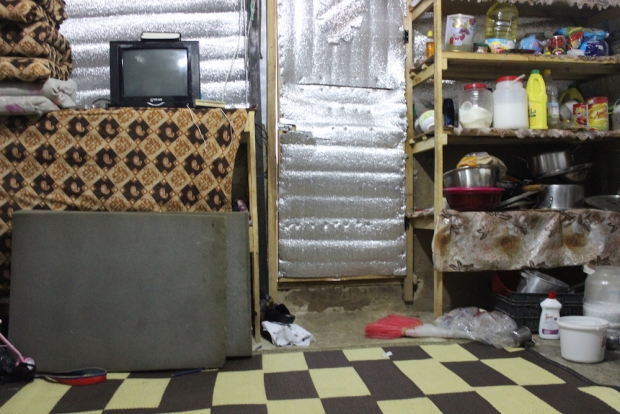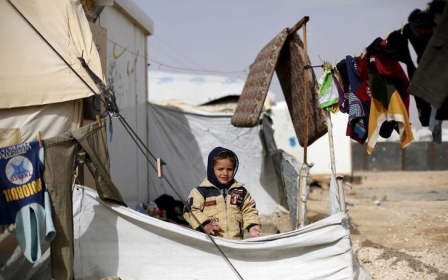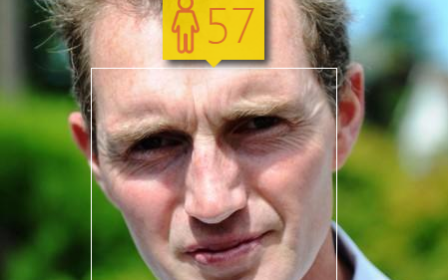'Where would we go?' Syrians fear eviction from Lebanon camps
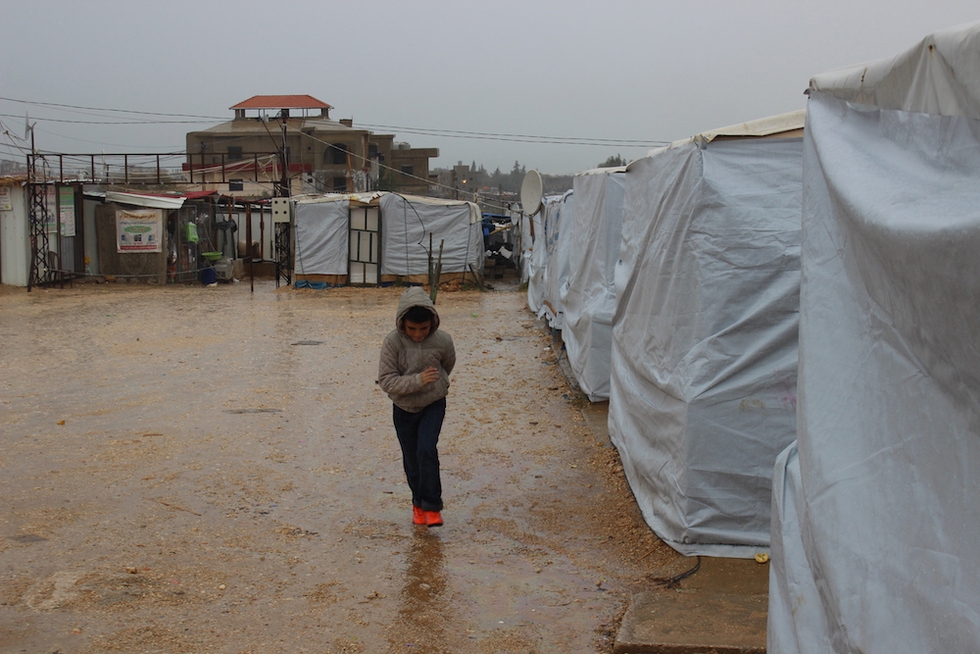
Akkar, Lebanon - Um Mohamed sits in her tent as torrential rain batters the canvas overhead, unfazed as the porch awning threatens to collapse under the weight of the collecting water. She has been here since fleeing Homs in 2013, but in recent weeks she has faced the prospect of finding another new "home".
Until last Friday she and the thousand other al-Reyhaniyeh camp residents, most of them women and children, had been living under the shadow of forced eviction by Lebanese authorities. Having made it this far, they had no where else to go.
"Where would we go?" says the widowed mother of two. "We feel secure here. We don’t have any alternatives. It was luck that we found somewhere to stay - here - but what would we do if we were made refugees again?"
The threat of eviction came on 10 November when men identifying themselves as Lebanese army intelligence arrived at the camp and give everyone 10 days to leave.
The 10-day deadline eventually passed with no news. A concerted civil society campaign launched in Beirut under the title, "A tent is not a threat," tried to drum up awareness and solidarity for the refugees’ situation.
Camp administrators meanwhile met army intelligence, military officials and influential Sunni politicians in an attempt to negotiate a way out.
Eventually, last Friday, the announcement came that the refugees in al-Reyhaniyeh would be able to stay - with conditions.
Army intelligence has requested that the camp site be extended and divided, with families spread out across a larger site. International NGOs may also offer to house a small number of the 200-plus families in rented accommodation outside.
But the threat of eviction has weighed heavy on those in this camp and has led to fears of action in the future by their host country.
No explanation, only threats
Details about why al-Reyhaniyeh was singled out by the authorities remain unclear.
No explicit reason was given for the eviction order, prompting the Lebanese Centre for Human Rights (CLDH) to demand the Lebanese authorities "open an immediate investigation," adding that if the "threat of eviction is not founded on any official and legal decision, the source of this threat has to be identified, investigated and prosecuted for threatening vulnerable individuals".
The Beirut-based NGO described condemned the "threat of unlawful forced eviction[s]".
Although the Lebanese armed forces declined to comment, a security source told The Daily Star recently that the proposed eviction was part of an army plan to "regulate" refugee camps.
"Until now, I really don’t know why," said Mohammad al-Qarhani from the Union of Relief and Development Associations (URDA), which provides services to the camp that maintains a small office at the camp’s entrance. He said the authorities have only provided a series of "unclear reasons" related to security.
"The army raided the camp several times before, and no one showed any opposition. Last time, after al-Qaa, they came to our camp ... and they didn’t find anything on anyone," he said, referring to a multiple suicide bombing attack in northeast Lebanon in late June that preceded a wave of raids and arrests of Syrian refugees across the country.
Several men were arrested from the camp but were released within two or three days, said Qarhani, adding that there have been no terrorism or related charges brought against any of the camp’s residents.
Several raids post-Qaa targeted Syrian communities in Akkar, including al-Reyhaniyeh, not least because of its proximity to the Syrian border.
In some cases, terrorism suspects have been found inside refugee camps in Lebanon, although the majority of post-Qaa arrests were related to refugees not having valid residency papers.
URDA is trying to work with the authorities to finally resolve the eviction issue.
"In the end, we didn’t want to have a confrontation with the intelligence. They are the strong organisation, not us," Qarhani said. "That’s why we entered into these negotiations and are taking into consideration their security concerns."
Porous borders
Akkar shares about 100km of border with Syria and is home to largely rural, poor Sunni communities as well as tens of thousands of Syrian refugees.
In some areas, refugees outnumber locals by three to one - although the communities are said to generally get on well, certainly better than in other areas of the country.
Akkar’s local economy has long depended on smuggling and trade with Lebanon’s northern neighbour, and since 2011 a lucrative cross-border smuggling trade in arms and other, less lethal, goods has flourished.
Some quarters of the Lebanese security apparatus are evidently concerned about cross-border security and also the vulnerability of underprivileged Lebanese and isolated Syrian settlements to recruiters from the Islamic State and Jabhat Fateh al-Sham.
However, human rights groups argue that the majority of refugees in al-Reyhaniyeh are vulnerable and in dire need of assistance.
An URDA survey stated that 85 percent of the camp’s residents are either women, children or the elderly. The majority of camp residents (52 percent) are children.
Many of the refugees suffer psychological trauma and are in need of support. A video of Um Mohamed distraught, weeping about the news of the eviction, was shared on social media.
She now dismisses it in a knot of frowns and embarrassed smiles.
Um Mamoun, a mother-of-three from northern Aleppo, meanwhile says the eviction order brought back painful memories of their original journey from Syria.
"My daughter until now has some kind of trauma … if she hears fireworks, she gets scared," she said, describing how the war has left its mark on the children.
"This year was the first time that when she hears the fireworks outside that she doesn’t tense her back and freeze up."
A safe return?
For now, they are safe. However, al-Reyhaniyeh may be the latest sign that some quarters of the Lebanese state are running out of patience with the protracted displacement of an estimated 1.5 million Syrians on Lebanese soil.
Lebanese officials have increasingly hinted at plans to coerce Syrian refugees into returning to Syria.
At the UN’s first-ever high-level international summit on refugees and migration, held in September this year, Lebanon’s then-prime minister, Tamam Salaam, called for the "safe return" of Syrian refugees to their homeland.
It was a call also taken up by Labour Minister Sejaan Azzi, who drew up plans for the categorisation and then staggered return of groups of refugees.
Some observers, meanwhile, have expressed concerns that the election of Hezbollah-allied President Michael Aoun may give further impetus to growing anti-refugee sentiment in Lebanese politics.
Lebanon’s unofficial - and often isolated, impoverished - Syrian refugee camps offer scant stability in the first place.
"We came from Syria, from devastation, and we were devastated too; we left everything behind, including our families, and we rebuilt ourselves through the community of the camp," said Um Ma’moun.
"[But] we do not have the strength to be displaced again. We have already left our country once. This is my new country, within the borders of the camp."
But if al-Reyhaniyeh heralds a new trend, in which Lebanese security forces actually follow up on months of threats of forcible evictions and repatriations, Syrian refugees in Lebanon may soon face an all-new period of instability and hardship.
New MEE newsletter: Jerusalem Dispatch
Sign up to get the latest insights and analysis on Israel-Palestine, alongside Turkey Unpacked and other MEE newsletters
Middle East Eye delivers independent and unrivalled coverage and analysis of the Middle East, North Africa and beyond. To learn more about republishing this content and the associated fees, please fill out this form. More about MEE can be found here.


